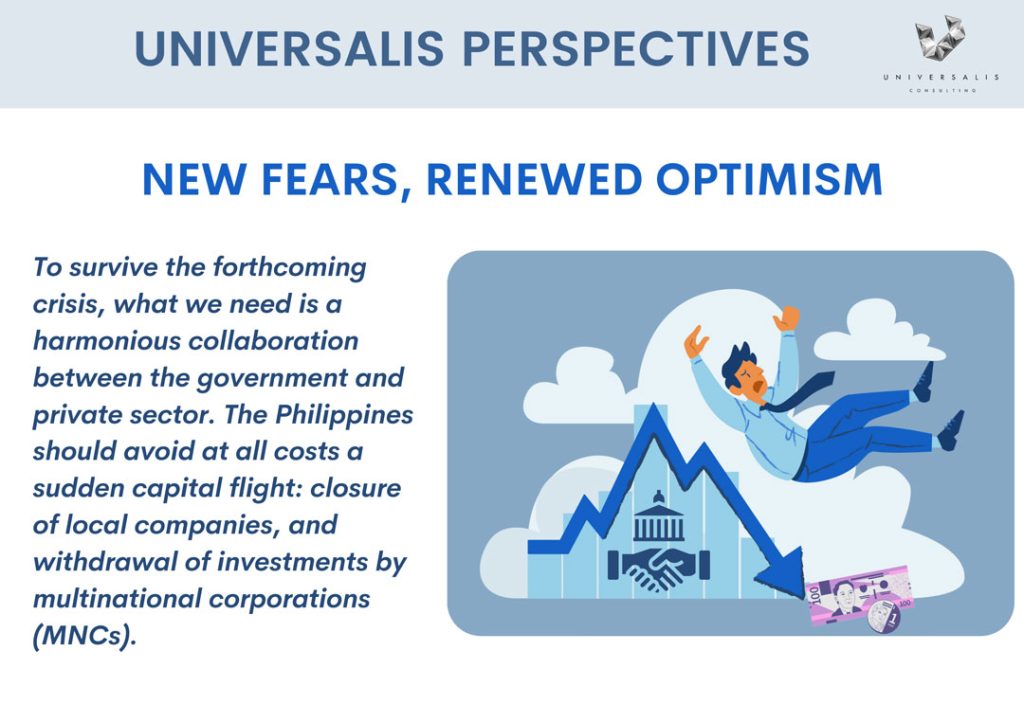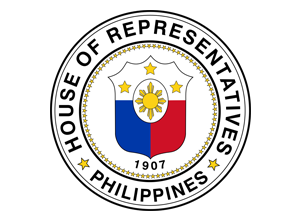Universalis Perspectives: New fears, renewed optimism

Aside from resilience, Filipinos are known for their optimism every new year. If one will notice, the annual December surveys show that high percentage of Filipinos usually looks forward for a better, comfortable life in the upcoming year. In fact, with the reopening of the economy and assumption of new administration in 2022, the December 2022 survey of the Social Weather Stations indicated that 95% of Filipinos are hopeful for 2023.
Such optimism is not baseless. Despite soaring inflation rates last year, the third quarter of 2022 saw a significant improvement in the country’s economy as the Philippines recorded a 7.6% GDP growth. Unemployment was also addressed as the number of jobless Filipinos in 2022 were reduced into 4.5% in October 2022 from 5% in the previous month. Aside from these figures, spending habits of Filipinos are also no strangers from what was referred as “revenge” spending after the pandemic particularly in terms of traveling and tourism.
However, while everyday affairs are gradually coming back to normal, most Filipinos are not aware or disregard the looming economic threat that will occur sometime mid-2023. As most experts predicted, a global recession is expected to take place within the year primarily caused by three factors, namely, the ongoing Russia-Ukraine war in Europe, the global inflation caused by the current US monetary policy, and the pandemic-caused disruption of global supply chains. The International Monetary Fund is clear in its warning, “2023 will be a difficult year”.
Unfortunately, while we do not wish to rain on someone’s parade as most Filipinos look forward for a better 2023, we need to brace for the impact of the upcoming recession in our country that might repeat, or probably inflict worse consequences, not only to the national economy but also the everyday livelihood of millions of Filipinos.
Surprisingly, the threat of the looming recession this year does not significantly alarm certain government officials. For BSP Governor Felipe Medalla, the Philippines will not experience a recession, but low growth. Meanwhile, for Finance Secretary Benjamin Diokno, the following Philippine sectors are in fact positioned to surge in 2023 despite the threat of economic slowdown, namely, manufacturing, construction, domestic demand, and labor force.
Such view is surprisingly supported by some business experts and economists. In an interview, Go Negosyo President Joey Concepcion provided a nuanced assessment as he noted that, while the retail sector will be negatively impacted by low demand abroad, tourism will still remain high, that will translate into support for micro-, small- and medium-scale enterprises (MSMEs) – the sector responsible for generating job opportunities for 60% of the Filipino labor force. Meanwhile, another economic expert from Manulife Investment Management argued that high domestic demand will keep the Philippine economy running despite predicted stagnation from overseas markets. Meanwhile, another columnist proposed that the Philippines should take advantage of its existing free trade agreements (e.g. RCEP) to mitigate the effects of recession.
While some personalities may find this sense of optimism as mere wishful thinking, we believe that these claims are sound based on the current state of Philippine economic policies, particularly in terms of trade and investments.
Prior to the leadership transition last June, the previous administration was able to liberalize the Philippine economy in order to position the country as an investment destination in the global economy. The passage of the three key pandemic recovery legislations, namely, amendments in the Foreign Investments Act, Retail Trade Liberalization Act and Public Service Act, served as a jumpstart as these laws provided additional flexibilities for the movement of capital in Philippine economy.
Another source of optimism is the innovations in economic planning introduced by the current administration. As noted by Finance Secretary Diokno, the introduction of the first ever Medium-Term Fiscal Policy Framework projects the impression of the sincere commitment of this administration to steer the health of Philippine economy back to its pre-pandemic state. In fact, the recent publication of the Philippine Development Plan 2023-2028 provides a guarantee that the government has a vision and plan to pursue.
In addition, the alignment and harmony between the executive and legislative departments of the government also provide a room of opportunity to address the forthcoming crisis. Coordination and mutual understanding between the two branches of the government are needed for swift action and delivery.
To survive the forthcoming crisis, what we need is a harmonious collaboration between the government and private sector. The Philippines should avoid at all costs a sudden capital flight: closure of local companies, and withdrawal of investments by multinational corporations (MNCs). While it is understandable that the government needs additional taxes in order to deliver public goods and services to the people, it is also recommended that the government should also accommodate the requests and concerns of various industries. It is necessary to bear in mind that the forthcoming recession will also occur simultaneously with high inflation. Increasing the taxes will affect the spending power of citizens which will further facilitate potential bankruptcy of businesses: a very unwelcoming scenario that the government should prevent.
The latest Philippine Development Plan is also clear: the administration is committed not only for a whole-of-government, but also of a whole-of-society approach for a better Philippines. Upholding this whole-of-society approach entails the provision of greater participation of the private sector in various aspects of governance. Hence, drastic changes and reforms on economic policies affecting the business sector should be minimized. The government should foster meaningful conversations instead of unilateral imposition of policy reforms. The International Monetary Fund was firm on its warning that 2023 will be a difficult year. To emerge victorious from this crisis, a coordinated effort between the government and the private sector is imperative and non-negotiable.


